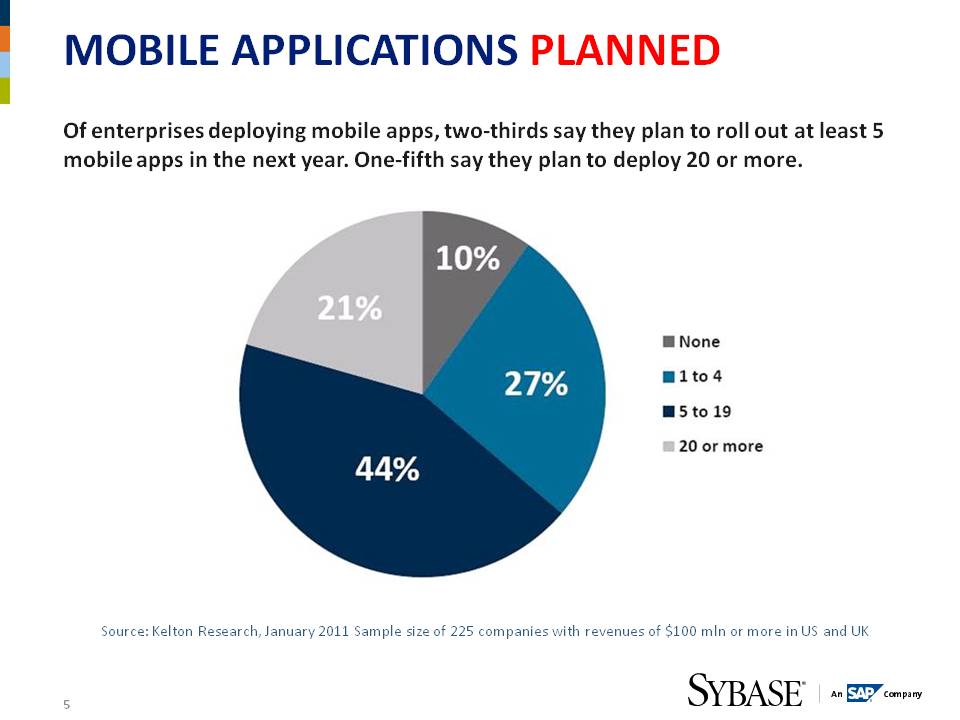Your Enterprise App Store: It's Coming Sooner Than You Think
Enterprise app store. The phrase might conjure up a vision of a glossy company-sanctioned portal for downloading updates to Fruit Ninja and your other time-wasting games. Alas, no.
As the ginormous Apple App Store is to Wal-Mart, an enterprise app store will be to your company's purchasing department - if the department consisted of thousands of personal shoppers.
That's because enterprise app stores are envisioned as being in-house portals for employees to provision their smartphones and tablets with the apps they need for their particular jobs (and only those apps).
The technology to build enterprise app stores is available today. Sybase's Afaria software [full disclosure: created by my employer] enables companies to create self-service portals hosting their own apps, as well as links to consumer or third-party apps hosted on external sites such as the Apple App Store or the Google Marketplace (for Android).
So far, enterprises haven't deployed Afaria's app store capabilities widely, according to Willie Jow, vice-president for mobility at Sybase.
But Jow expects enterprise app stores to take off very soon for a wide variety of reasons:
1) In the post-BlackBerry world, app stores make the most sense to manage deployments of apps to hundreds or thousands of employees all running different operating systems and devices.
2) App deployments by businesses are taking off. Research conducted by Sybase and Kelton Research earlier this year found that two-thirds of companies plan to roll out 5 or more mobile apps this year. 21% plan to roll out 20 or more.
3) This enterprise app boom is due to two reasons. First, vendors like SAP and Sybase are preparing to roll out a whole fleet of mobile apps this year. These pre-built/pre-packaged apps may still require some customization by the individual enterprise. But they are certainly much faster and less expensive than building a mobile enterprise app from the ground up.
Second, the difficult truth is that the user interfaces for smartphones and even tablets make them less adept than PCs for many tasks. As a result, smart developers need, in Jow's words, to "chunkify" (divide up) large server applications into smaller apps because "when I'm mobile, I don't want to go 7 screens deep to do what I need to do. I want to be quick."
Chunkifying large applications is not only less wasteful, but it lets companies selectively deploy only the right functions to the right employees, says Jow. "Not every employee needs the ability to do approvals, or view analytic dashboards," he said.
4) Self-service enterprise app stores make sense for a pair of technical reasons. Windows PCs are typically handed out to employees after IT has wiped the hard drive and installed a new "image" with the operating system and required software. You can't do that with smartphones and tablets brought into the workplace by employees under a Bring Your Own Device policy. Employees not only want to keep their personal data safe, but they will balk at the notion of IT taking their device away for half a day or more, says Jow.
The other reason that self-service app stores make sense is that the connectivity situation with smartphones and tablets. Forcibly pushing out new Windows updates to a desktop or even Wi-Fi-only laptop PC might be ok, but it could cause an iPad connected via 3G to become unusably slow or, worse, result in unexpectedly-large service charges. Thus, the app store's gentle 'pull' model makes more sense than a dictatorial 'push' model.
5) Enterprise app stores will start out as portals purely for internal provisioning. But just as corporate intranets evolved into B2B customer-facing extranets, these enterprise app stores will eventually also service corporate partners and vendors, argues Jow.
As for the notion of third-party marketplaces devoted solely to enterprise apps (what readers might have thought I meant by 'enterprise app store'), Jow isn't a believer. He expects mobile apps created by independent software vendors to continue to be sold primarily through Apple and a "few other megastores."
